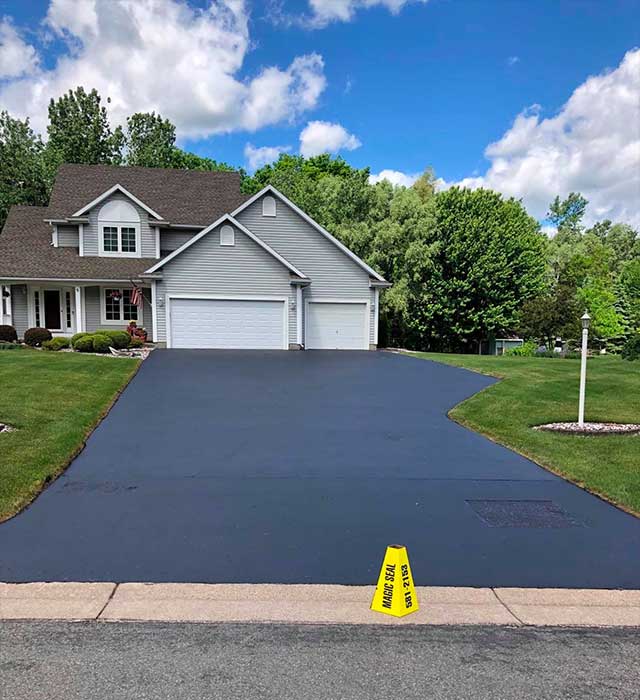Maximize Safety And Security with Angle Parking Lot: Superior Asphalt Sealing
Cold Mix Asphalt Vs. Hot Mix Asphalt: Which Is Right for You?

Make-up Differences
Cold mix and warm mix asphalts vary considerably in their make-up, with distinct qualities that influence their efficiency and applications. Cold mix asphalt is produced by emulsifying the asphalt binder with water and an emulsifying agent before mixing it with accumulation. This approach enables the asphalt to be workable at lower temperature levels, making it ideal for short-term repair services and for usage in cooler climate condition. Hot mix asphalt, on the various other hand, is made at heats, generally between 300-350 ° F, which assists to accomplish far better compaction and an extra sturdy end product. The hot mix asphalt production process involves heating up the accumulation and asphalt binder individually prior to integrating them at the asphalt plant.
Furthermore, cold mix asphalt often tends to be much less dense and more versatile than hot mix asphalt. This flexibility makes it better matched for locations with greater levels of movement, such as driveways or roadways with heavy website traffic. In contrast, warm mix asphalt is understood for its high resilience and resistance to rutting and splitting, making it a recommended option for freeways and high-traffic roadways where durability is important.
Setup Refine Differences
The procedure of setting up chilly mix and hot mix asphalt displays noteworthy variations in their demands and treatments. In contrast, warm mix asphalt demands a much more fancy setup process. Due to the home heating demands, warm mix asphalt installations are generally lugged out by specialists with specialized devices, making sure a much more structurally sound and irreversible result.
Resilience and Longevity Variables
When thinking about asphalt choices, longevity and durability are crucial factors to evaluate for lasting sidewalk performance. Hot mix asphalt (HMA) is understood for its phenomenal toughness and longevity.
In terms of durability, HMA commonly outperforms CMA because of its remarkable stamina and resistance homes. HMA sidewalks have a longer solution life, requiring less constant fixings and maintenance, which can equate to cost financial savings in the long run. Additionally, HMA sidewalks are more easily personalized to meet particular task requirements, further improving their longevity.
Price Factors To Consider
Considering the monetary implications is an essential aspect when evaluating the option between hot mix asphalt (HMA) and chilly mix asphalt (CMA) for sidewalk jobs. While the first price of hot mix asphalt is typically greater than that of cold mix asphalt, HMA often offers a more cost-efficient service in the future as a result of its superior durability and long life. HMA is recognized go now for its ability to hold up against heavy website traffic loads and extreme climate problems, decreasing the demand for regular repair services and maintenance. On the other hand, cold mix asphalt is extra affordable in advance but might require more constant patching and resurfacing, causing higher upkeep expenses over time.
In addition to product expenses, it's vital to consider the costs connected with setup and maintenance when comparing HMA and CMA. HMA generally requires specific tools and skilled labor for correct setup, which can influence general task prices. On the other hand, CMA is much easier to function with and can often be applied utilizing less complex techniques, potentially decreasing installment costs. Ultimately, the decision in between HMA and CMA should take right into account not just the first cost yet likewise the long-lasting economic implications to establish one of the most cost-effective choice for the certain pavement job.
Environmental Influence Comparison
Comparison of the environmental influences between hot mix asphalt (HMA) and cool mix asphalt (CMA) Click This Link reveals distinctive differences in sustainability techniques. HMA manufacturing requires heats, leading to enhanced energy intake and greenhouse gas emissions. The process also releases unpredictable organic substances (VOCs) and dangerous air toxins (HAPs) into the environment. In comparison, CMA is created and applied at lower temperature levels, reducing power usage and discharges dramatically. The lower production temperature levels of CMA result in lowered fuel consumption and lower degrees of carbon dioxide emissions, making it an extra eco-friendly choice.
Moreover, using CMA usually includes reusing existing asphalt sidewalk, promoting resource conservation and lowering the quantity of waste sent out to land fills. This reusing facet further boosts the sustainability of CMA contrasted to HMA. Generally, when taking into consideration the environmental impact, CMA emerges as a more ecologically lasting selection because of its lower power needs, lowered emissions, and the possibility for recycling existing products. By selecting CMA over HMA, roadway construction tasks can contribute favorably to environmental conservation efforts.
Final Thought
In final thought, the option between chilly mix asphalt (CMA) and hot mix asphalt (HMA) relies on numerous elements such as composition, installment process, toughness, durability, price, and ecological effect. angle parking. While CMA uses a economical and fast service for minor repair services, HMA guarantees superior resilience and durability for hefty traffic areas. Think about these elements thoroughly to figure out which kind of asphalt is the ideal selection for your paving needs

Considering the financial effects is a crucial element when reviewing the selection in between hot mix asphalt (HMA) and cool mix asphalt (CMA) for sidewalk tasks. While the first price of warm mix asphalt is commonly greater than that of chilly mix asphalt, HMA usually gives a more cost-efficient option in the long run due to its superior resilience and durability. asphalt this hyperlink repair.Comparison of the ecological influences between hot mix asphalt (HMA) and cool mix asphalt (CMA) reveals distinctive distinctions in sustainability methods.In verdict, the choice in between chilly mix asphalt (CMA) and warm mix asphalt (HMA) depends on numerous factors such as composition, installation process, toughness, longevity, price, and ecological effect